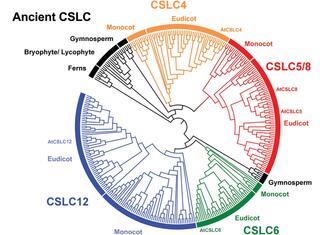Discovery of a new strategy to produce biofuel-relevant carbohydrates in plants

Specific disruption of plant cell wall composition could provide new routes to overproduce desired sugars for conversion to biofuels.
The Science
Plant cells have a polysaccharide-based wall that maintains structural and functional integrity and determines shape. The wall components reorganize and shift during plant growth and differentiation. Xyloglucan is an abundant polysaccharide in the cell walls of most plants and has been thought to play an important role in this reorganization. Great Lakes Bioenergy Research Center (GLBRC) researchers identified the genes responsible for xyloglucan synthesis in Arabidopsis and showed that, surprisingly, xyloglucan is not necessary for plant growth and development. These results raise important questions regarding cell wall structure and its reorganization during growth.
The Impact
Understanding plant cell wall structure is important for experiments aimed at engineering superior crop traits. The new research demonstrates that xyloglucan, a hemicellulose abundant in dicots and some grasses, is not essential for plant growth and development. This finding calls into question the longstanding idea that xyloglucan plays an important role in plant cell wall structure and reorganization during growth. The study opens up future research to understand whether xyloglucan may be important in specific stress situations, as well as whether removal of xyloglucan from plant cell walls might allow its replacement with other, biofuel-relevant carbohydrates without affecting plant yield.
Summary
The structure of xyloglucan is well understood, but its biosynthesis is not. GLBRC researchers employed reverse genetics to investigate the role of an enzyme family called cellulose synthase like-C (CSLC) in xyloglucan biosynthesis. Arabidopsis has five CSLC genes. The researchers found that Arabidopsis plants with mutations in any one of the five CSLC genes had normal levels of xyloglucan. Mutations in multiple genes significantly reduced xyloglucan levels and caused mild changes in some plant tissues. However, plants with disruptions in all five CSLC genes grew and developed normally despite having no detectable xyloglucan at all. The cslc quintuple mutant also showed no major changes in the expression of other genes. The researchers conclude that the CSLC genes encode xyloglucan glucan synthases and found that these genes are widespread in the plant kingdom and evolved from an ancient family. The mutants generated in this work will provide valuable tools with which to study both the molecular details of xyloglucan biosynthesis and the role of xyloglucan in plant cell wall structure and function.
Program Manager
N. Kent Peters
kent.peters@science.doe.gov, 301-903-5549
Corresponding Author
Federica Brandizzi
fb@msu.edu
Kenneth Keegstra
keegstra@msu.edu
Funding
This work was funded primarily by the DOE Great Lakes Bioenergy Research Center (DOE BER Office of Science DE-FC02-07ER64494 and DE-SC0018409). Additional support was provided by the Chemical Sciences, Geosciences and Biosciences Division, Office of Basic Energy Sciences, Office of Science, US Department of Energy (award number DE-FG02-91ER20021), National Science Foundation (MCB1727362), AgBioResearch (MICL02598), and the Deutsche Forschungsgemeinschaft (DFG, German Research Foundation) under Germany´s Excellence Strategy – EXC-2048/1 – project ID 390686111.
Publications
Kim, S.-J., Chandrasekar, B., Rea, A.C., Danhof, L., Zemelis-Durfee, S., Thrower, N., Shepard, Z.S., Pauly, M., Brandizzi, F., and Keegstra, K., “The synthesis of xyloglucan, an abundant plant cell wall polysaccharide, requires CSLC function.” Proc. Natl. Acad. Sci. USA Epub July 31. (2020). [DOI: https://doi.org/10.1073/pnas.2007245117]
Related Links
https://www.pnas.org/content/early/2020/07/30/2007245117